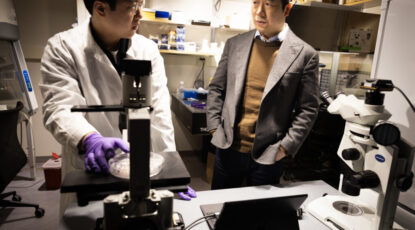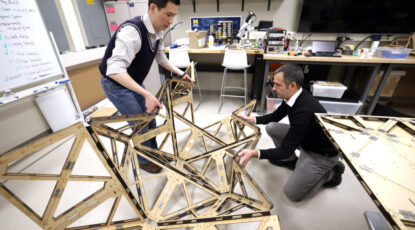Research News
-
The most precise measurement of our expanding universe
With 5,000 tiny robots in a mountaintop telescope, researchers can look 11 billion years into the past. Now, using the largest 3D map of our cosmos ever constructed, the Dark Energy Spectroscopic Instrument reveals the most precise measurements to date of how fast the universe has expanded throughout its history.
-
Earliest recorded ‘ice-out’ date on Douglas Lake at U-M Biological Station
The ice-out, declared on March 16 this year, comes after the latest-recorded Douglas Lake “ice-in” occurred on Jan. 6 — making this the shortest season of lake ice cover recorded at the BioStation in Northern Michigan: just 70 days.
-
What Ohtani scandal means for his career, fans and team
U-M experts discuss the scandal involving Los Angeles Dodgers player Shohei Ohtani (formerly of the Los Angeles Angels) and interpreter Ippei Mizuhara, who was fired for stealing $4.5 million from Ohtani’s bank account to pay off gambling debts.
-
U-M astronomers conduct first search for forming planets with new space telescope
Planets form in disks of dust and gas called protoplanetary disks that whirl around a central protostar during its final assembly. While such disks have been imaged, just two planets have been caught in the act of forming so far. Astronomers are now aiming the James Webb Space Telescope at protoplanetary disks to find clues about the ways in which planets form, and how they influence their natal disk.
-
New Michigan poverty map identifies needs related to education, food insecurity, affordable housing
A new data map showcasing diverse indicators of poverty and well-being throughout Michigan highlights the key challenges confronting residents in different parts of the state and suggests interventions for the state’s most critical needs. The latest map features 2021 data from the Census Bureau’s American Community Survey.
-
Could riding older school buses hinder student performance?
Students who ride newer, cleaner-air buses to school have improved academic performance, according to a U-M study that linked school bus funding information with standardized test scores and found improvements in reading/language arts and math scores when the oldest buses were replaced with newer vehicles.
-
Human stem cells coaxed to mimic the very early central nervous system
The first stem cell culture method that produces a full model of the early stages of the human central nervous system has been developed by a team of engineers and biologists at U-M, the Weizmann Institute of Science, and the University of Pennsylvania. The model, which resembles all three sections of the embryonic brain and spinal cord, could shed light on developmental brain diseases.
-
Bridge in a box: Unlocking origami’s power to produce load-bearing structures
For the first time, load-bearing structures like bridges and shelters can be made with origami modules — versatile components that can fold compactly and adapt into different shapes. It’s an advance that could enable communities to quickly rebuild facilities and systems damaged or destroyed during natural disasters, or allow for construction in places that were previously considered impractical, including outer space.
-
Futuristic technology reveals secrets in ancient Vesuvius Scrolls
When Italy’s Mount Vesuvius erupted in AD 79, it buried the palatial villa of Lucius Calpurnius Piso Caesoninus, Julius Caesar’s father-in-law. These black and brittle papyri may look like charred croissants, but U-M classicist Richard Janko believes they contain lost masterpieces of literature, history, and philosophy.










